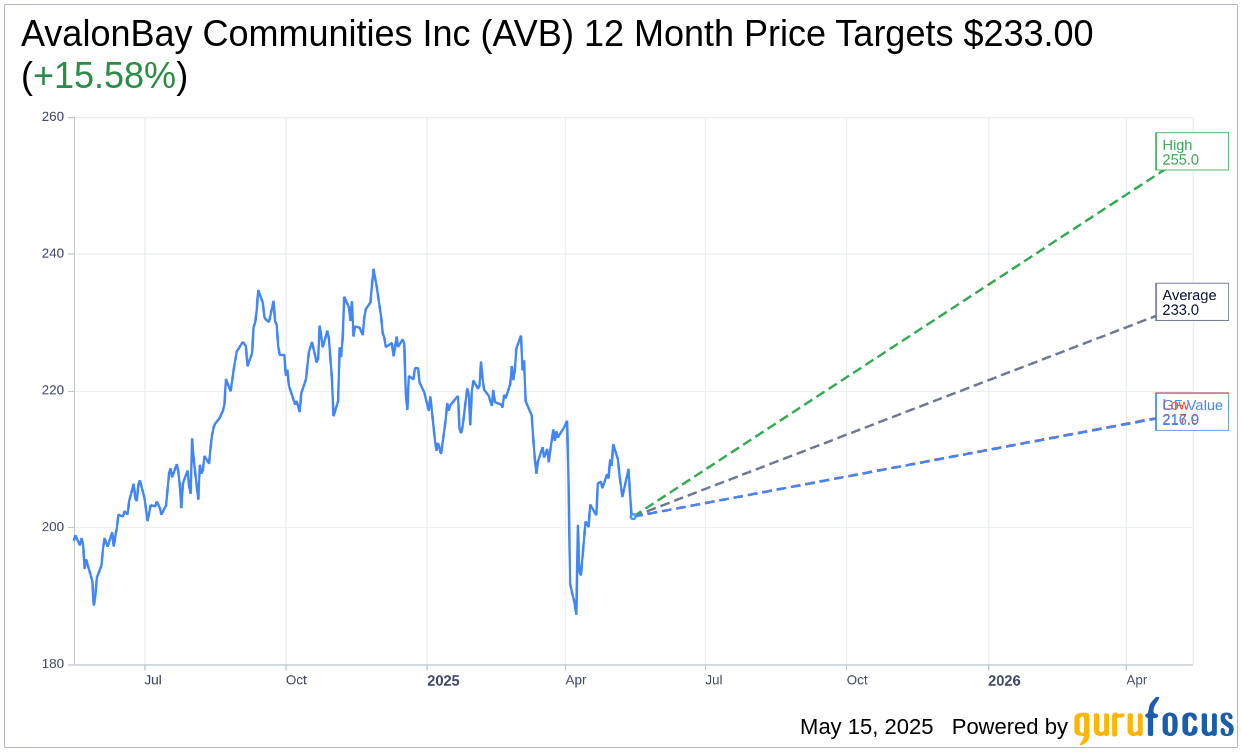Morgan Stanley analyst Adam Kramer has adjusted the price target for AvalonBay (AVB, Financial), increasing it slightly from $226 to $228 while maintaining an Equal Weight rating. This adjustment follows the updated estimates reflecting the company's first-quarter earnings. Importantly, the firm's forecast for the fund from operations (FFO) per share for the fiscal year 2025 remains at $11.39. However, there's an upward revision for the fiscal year 2026 FFO per share, now projected at $11.99, up from the previous $11.87.
Wall Street Analysts Forecast

Based on the one-year price targets offered by 19 analysts, the average target price for AvalonBay Communities Inc (AVB, Financial) is $233.00 with a high estimate of $255.00 and a low estimate of $217.00. The average target implies an upside of 15.58% from the current price of $201.60. More detailed estimate data can be found on the AvalonBay Communities Inc (AVB) Forecast page.
Based on the consensus recommendation from 24 brokerage firms, AvalonBay Communities Inc's (AVB, Financial) average brokerage recommendation is currently 2.5, indicating "Outperform" status. The rating scale ranges from 1 to 5, where 1 signifies Strong Buy, and 5 denotes Sell.
Based on GuruFocus estimates, the estimated GF Value for AvalonBay Communities Inc (AVB, Financial) in one year is $216.93, suggesting a upside of 7.6% from the current price of $201.6. GF Value is GuruFocus' estimate of the fair value that the stock should be traded at. It is calculated based on the historical multiples the stock has traded at previously, as well as past business growth and the future estimates of the business' performance. More detailed data can be found on the AvalonBay Communities Inc (AVB) Summary page.
AVB Key Business Developments
Release Date: May 01, 2025
- Core FFO Growth: 4.8% in Q1 relative to last year, exceeding prior Q1 guidance by $0.03.
- Development Projects: $3 billion of projects underway, match-funded with attractively priced capital.
- Equity Raised: $890 million of equity raised on a forward basis at an average gross price of $226 per share.
- Occupancy: April occupancy roughly 30 basis points above the same time last year.
- Same-Store Revenue: Slightly ahead of plan due to modestly higher occupancy.
- Year-to-Date Average Asking Rent Increase: Roughly 5%, led by San Francisco with gains of approximately 7%.
- Liquidity: $2.8 billion of liquidity, supported by recent financing transactions.
- Unsecured Delayed Draw Term Loan: $450 million hedged to an effective fixed interest rate of 4.5%.
- Commercial Paper Program: Expanded to $1 billion, backed by a secured credit facility of $2.5 billion.
For the complete transcript of the earnings call, please refer to the full earnings call transcript.
Positive Points
- AvalonBay Communities Inc (AVB, Financial) reported strong core FFO growth of 4.8% in Q1 2025, exceeding prior guidance by $0.03.
- The company has a robust development pipeline with $3 billion in projects underway, expected to drive significant earnings growth as they lease up.
- AvalonBay's balance sheet and liquidity position are strong, with $2.8 billion in liquidity and $890 million in undrawn equity capital.
- The company is benefiting from strong occupancy rates and limited new deliveries in established regions, supporting healthy pricing power.
- AvalonBay has successfully raised $890 million of equity at an attractive price, which will be deployed into accretive development opportunities.
Negative Points
- The company is experiencing operating softness in its expansion regions due to high levels of new deliveries, impacting market occupancies.
- Renewal rate growth has moderated and is lower than in previous years, indicating potential challenges in achieving higher rent increases.
- The Los Angeles market is underperforming due to weak job growth, particularly in the entertainment sector, affecting rent growth.
- There is uncertainty in the job market, with residents expressing concerns about job security, which could impact leasing decisions.
- The company faces potential cost increases due to tariffs, which could raise total project costs by about 3% to 4%.
